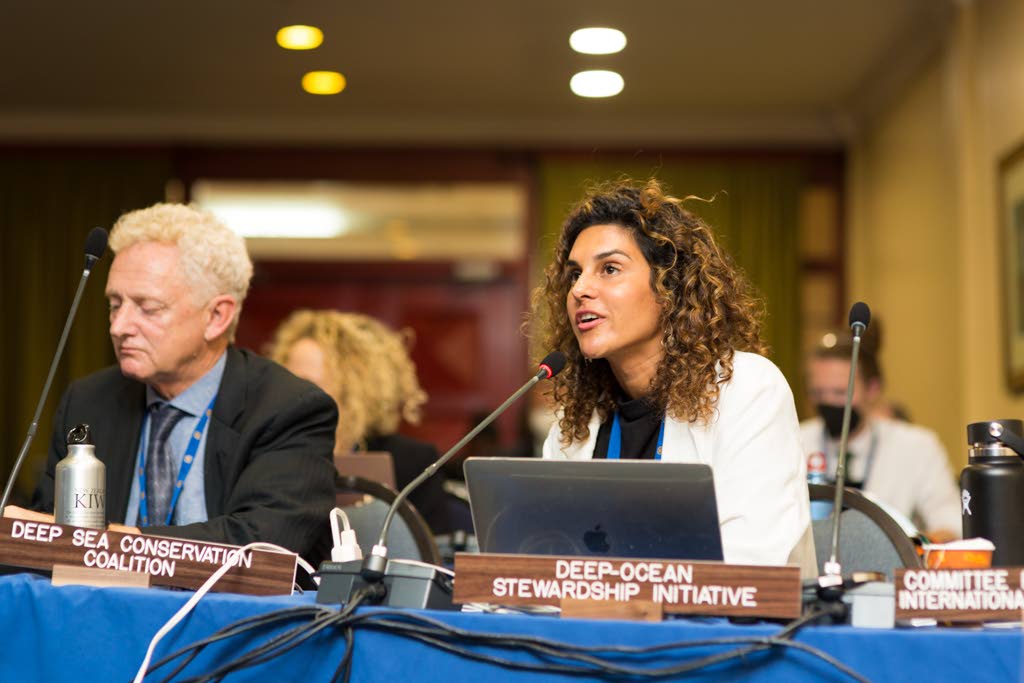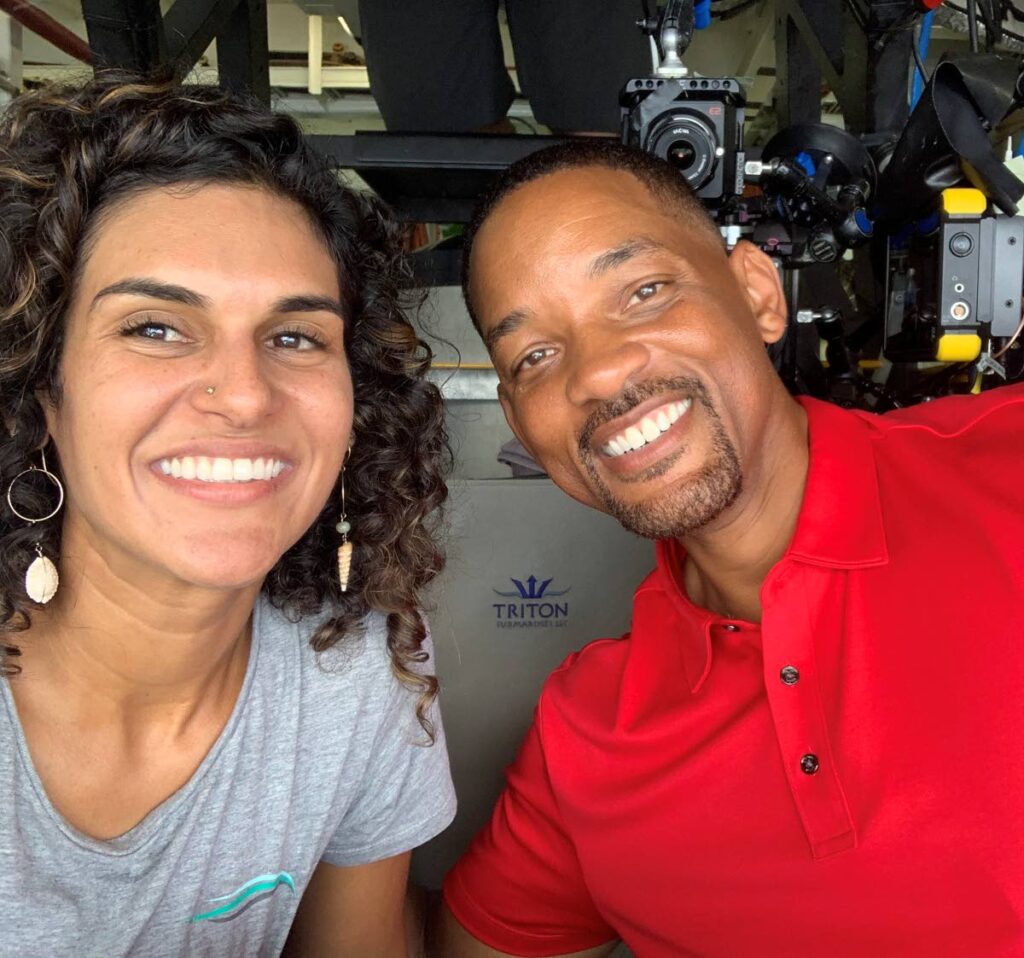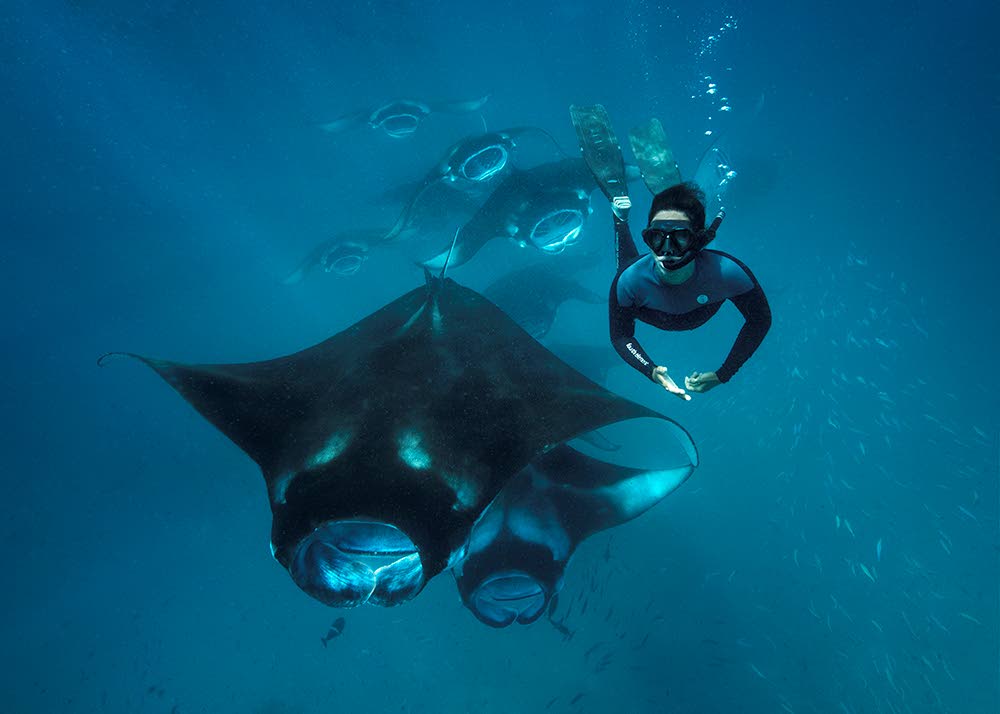Breaking barriers beneath the waves - Inspiring journey of marine biologist Diva Amon

BAVINA SOOKDEO
Diva Amon, 36,a world-renowned Trinidadian marine biologist, had some advice to share with young women worldwide on International Women’s Day.
“Don’t compromise on those values that you hold dear. Stand by them. Preserving your self-integrity will allow you to believe in your actions and live with joy and a peace of mind.”
Amon, who recently completed Welcome to Earth, a Disney+ National Geographic series with US actor Will Smith, comes from Maraval and is an alumna of St Joseph’s Convent, Port of Spain. She has a PhD in ocean and earth science, and her journey into marine biology was deeply influenced by her upbringing in Trinidad and Tobago.

“I feel so grateful to have grown up in Trinidad and Tobago and the Caribbean, where hours were spent playing on the beach, snorkelling, and sailing. Often I would look out to sea and wish I could pull away that dark water to reveal what was living down in the depths.”
Amon reminisces, “The Caribbean was where my love for the ocean blossomed, but it wasn’t until years later, while at university, that I realised there was so much more about the ocean to love than what meets the eye in the shallows.
“Many of my earliest memories include ocean life. Growing up, the ocean was my playmate, but now the ocean has become like a family member – a place that I want to understand, to protect and to respect.”
Amon’s passion for deep-sea exploration was ignited during a university module when her professor highlighted that far less than one per cent of the ocean had ever been explored.
“And who doesn’t want to be an explorer?
“Now my desire to explore has evolved away from exploration for exploring’s sake, into exploration to better understand and conserve.”

Amon’s work often takes her to remote marine environments worldwide, spanning 45 countries, all continents and all ocean basins. From the Arctic to the Antarctic, from the Mariana Trench to the Cayman Trenches, to St Paul and Peter’s Archipelago, the Seychelles and most of the Caribbean, Amon has traversed the globe in pursuit of oceanic knowledge.
However, she admits, “Despite this, I am still happiest sitting in my back garden in Trinidad.”

As a marine scientist from Trinidad, Amon brings a unique perspective to her field. She emphasises the lack of diversity, equity and inclusion in deep-ocean exploration, noting the disproportionate representation of wealthy nations in marine science.
“Deep-ocean science is incredibly resource-intensive – you need expensive ships and equipment. This means that most deep-sea exploration and science has been done by wealthy countries or individuals, and most countries, like Trinidad and Tobago and other Caribbean islands, are not able to participate.

“This is linked to deep-ocean exploration and science hugely lacking in diversity, equity and inclusion. We don’t all have a seat at the table, even though we all have a stake. This lack of perspectives leads to poorer science.”
She pointed out that the ocean is truly global, so all of humankind, not just an elite few, should know enough to inform the decisions that are taken, because ultimately that’s how it will be preserved for generations to come.
“I know and understand what a privilege it is to work in the deep ocean, especially in the Caribbean. When you don’t get many opportunities to work there, you must make those chances count for the greater good.
“So I’m taking steps to answer the most relevant questions, for example, what is in the deep ocean? How can be better stewards of it? How can we have more underrepresented groups participating, so that we can work together to make the best effort to ensure it is here for many more to experience?
“As an intersectional individual (a woman of colour from a less economically developed country), the challenges have certainly existed – spending many weeks to months at a time on research ships out in the ocean is such an incredible privilege, but sometimes these remote experiences can be places of discrimination, bullying, harassment and assault.
“A lot more needs to be done to ensure that being at sea is a safe working experience for all. I feel very grateful to have had so many allies, supporters and mentors along the way, and I feel fortunate to now be in a position where I can help to make changes to make the road less rocky for budding marine scientists.”

Asked, based on her experience, what are some of the main obstacles preventing greater representation of Caribbean women in marine science, especially in areas such as deep-sea exploration, she said, “In my opinion, one of the main issues is retaining (not producing) female marine scientists regionally.
“There are so many brilliant women who study marine science but are unable to get jobs locally, and that is largely because there aren’t enough resources or importance allocated to this field. We must create more roles and then when we do, we need to support them adequately, allowing women to have better work-life balance (including maternity leave), and working spaces safe from discrimination, bullying and harassment.”
SpeSeas is a diverse group of Trinidad and Tobago scientists, conservationists and communicators who wish to make positive changes to the way the ocean is used and managed in the country, the region and the world.
As the founder and director of SpeSeas and an official National Geographic explorer, Amon leads initiatives to promote diversity, equity and inclusion in marine science.
“SpeSeas knows that the more people there are that understand and value the absolute majesty of the ocean, the better.
“So education and empowerment is one of our three pillars. We provide opportunities to get experience in the field, we mentor in research, education and advocacy, we do a lot of outreach events, where we share our experiences and try to grow ocean literacy.”
Also, Amon, with National Geographic’s help via television, speaking tours and social media, tries to share her experiences and knowledge of the ocean with as many people as possible.
National Geographic made her an Emerging Explorer in 2020 after seeing not just her deep-sea research, but also how much effort she put into communicating on it with decision-makers and the public.

“Filming Welcome to Earth was blow-mind! Will Smith was lovely, and working with him were some of the easiest days of my career – but being in the ocean surrounded by sperm whales in the Azores and hundreds of mantas in the Maldives was the icing on the cake.”
Reflecting on this recent collaboration with Smith, Amon expressed gratitude for the overwhelmingly positive response, particularly from fellow Caribbean people.
“Nothing can compare to how wonderful it was to receive messages from West Indians, hearing how proud it made them to see a Trini in this position, or someone that looked like them and represented them, has been the best part of what I do.”
Looking ahead, Amon’s goals include advancing the understanding and stewardship of the deep ocean, both locally and globally.
“The deep ocean is absolutely essential to keeping our planet healthy and keeping us alive by providing key ecosystem services and resources. For instance, it regulates our climate and supports fisheries and could help to solve some of biggest challenges facing humanity.
“But it is out of sight and out of mind, but not out of our reach. Deep sea does not deal well with impacts from our activities.
“Most of the time, damage is irreversible on human timescales. Once we break it, we can’t fix it. There is so much to do locally and globally. I have immense privilege of actually going down there to experience it, and having one of the best understandings of it, including its vulnerabilities, so I have a moral imperative to work to preserve it.”
Amon advocates for top-down conservation measures and urges a moratorium on deep-sea mining to prevent irreversible damage to marine ecosystems.
“We need a moratorium now on deep-sea mining, and it would be great to see Trinidad and Tobago and other Caribbean nations join the 24 countries that have already called for it,” she said.
As International Women’s Day is celebrated, Amon’s additional message to young girls and women aspiring to careers in marine science is clear: “Do it! There is no time in history when we have needed scientists and conservationists more. It’s a challenging road but one that is so incredibly rewarding.”
In recognition of her groundbreaking work, Amon recently received the Anthony N Sabga Award for Caribbean Excellence, which she cherishes deeply.

“It is such an honour to be following in the footsteps of so many incredible Caribbean changemakers. I am so thankful to Ansa for creating one of the few awards that allows recognition of Caribbean individuals including scientists. There is no higher honour than being recognised in your own home country and region, and I hope this is a step towards marine science being seen more as a critical career path.
“I am also extremely grateful to the many people who have lifted me into this position: family, especially my mum, friends and colleagues.
As Diva Amon continues her pioneering journey in marine biology, she remains committed to inspiring inclusion and paving the way for future generations of ocean explorers, especially women and underrepresented groups, to make their mark in the field.


Comments
"Breaking barriers beneath the waves – Inspiring journey of marine biologist Diva Amon"